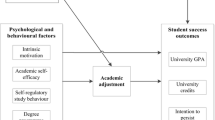Abstract
The aim of this study is to explore the various factors involved in pursuing a master’s degree for university graduates in South Korea. After reviewing theoretical frameworks, including human and social capital theories, an analytical model was constructed to examine the different academic and economic factors involved in pursuing a master’s degree, considering different institutional backgrounds. The data used were collected from the Graduates Occupational Mobility Survey conducted by the Korean Employment Information Service. We obtained the data from 11,960 respondents who graduated from university in 2013. Descriptive statistics and logistics regression were used in the analysis. The results show that gender, age and family socioeconomic status affected students’ decision to pursue a master’s degree. In addition, academic background factors, such as discipline, satisfaction with undergraduate study and intrinsic motivation for the choice of major, had positive effects on enrolment in master’s degrees. However, active participation in the job search process during undergraduate study had negative effects on the decision. Students in research universities in major cities were more likely to pursue a master’s degree than those in teaching-oriented universities in local provinces. This study has implications for the motivations, demands and career paths of postgraduate students taking master’s degrees.
Similar content being viewed by others
References
Austin, A. E. (2002). Preparing the next generation of faculty. The Journal of Higher Education, 73(1), 94–122.
Becker, G. S. (1962). Investment in human capital: a theoretical analysis. The Journal of Political Economy, 70(5), 9–49.
Bilder, A. E., & Conrad, C. E. (1996). Challenges in assessing outcomes in graduate and professional education. New Directions for Institutional Research, 92, 5–15.
Boylan, M. (2009). Undergraduate STEM research experiences: impact on student interest in doing graduate work in STEM fields. In R. G. Ehrenberg & C. V. Kuh (Eds.), Doctoral education and the faculty of the future (pp. 109–119). Ithaca, NY: Cornell University Press.
Committee on Enhancing the Master’s degree in the Natural Sciences. (2008). Science professionals: master’s education for a competitive world. Washington, DC: National Academies Press.
Conrad, C., Haworth, J. G., & Millar, S. B. (1993). A silent success: master’s education in the United States. Baltimore: Johns Hopkins University Press.
Dinwoodie, J. (2001). Motivational profiling of logistic master’s students in Great Britain. International Journal of Physical Distribution & Logistics, 31(3), 187–202.
Drennan, J. (2012). Masters in nursing degrees: an evaluation of management and leadership outcomes using a retrospective pre-test design. Journal of Nursing Management, 20, 102–112.
Dumais, S. A. (2002). Cultural capital, gender, and school success: the role of habitus. Sociology of Education, 75(1), 44–68.
Edirisinghe, R., & Fraser, K. (2015). The masters of sustainable practice: a review of a program for working professionals. Australian Journal of Environmental Education, 30(2), 239–253.
Edwards, D. (2011). Monitoring risk and return: critical insights into graduate coursework engagement and outcomes AUSSE Research Briefing (Vol. 9). Melbourne: Australian Council for Educational Research.
English, D., & Umbach, P. D. (2016). Graduate school choice: an examination of individual and institutional effects. The Review of Higher Education, 39(2), 173–211.
Fox, M. (1992). Student debt and enrollment in graduate and professional school. Applied Economics, 24, 669–677.
Glazer-Raymo, J. (2005). Professionalizing graduate education: the master’s degree in the marketplace. ASHE Higher Education Report, 31(4).
Hartman, D. E., & Schmidt, S. L. (1995). Understanding student/alumni satisfaction from a consumer’s perspective: the effects of institutional performance and program outcomes. Research in Higher Education, 36(2), 197–217.
Haworth, J. G., & Conrad, C. E. (1997). Emblems of quality in higher education: developing and sustaining high-quality programs. Boston: Allyn and Bacon.
Hearn, J. C. (1987). Impacts of undergraduate experiences on aspirations and plans for graduate and professional education. Research in Higher Education, 27, 119–141.
Heller, D. E. (2001). Debts and decisions: student loans and their relationship to graduate school and career choice. New Agenda Series. Volume 3, Number 4. Lumina Foundation for Education.
Hirt, J. B., & Mufflo, J. A. (1996). Graduate students: institutional climates and disciplinary cultures. New Directions for Institutional Research, 92, 17–33.
Hultberg, P., Calonge, D. S., & Kim, S.-H. (2017). Education policy in South Korea: a contemporary model of human capital accumulation? Cogent Economics and Finance, 5(1), 1–16.
Jung, J. (2018a). Domestic and overseas doctorates and their academic job entries in South Korea. Asian Education and Development Studies, 7(2), 205–222.
Jung, J. (2018b). Higher education in Korea: Western influences, Asian values and indigenous processes. Journal of Asian Public Policy, 11(1), 1–13.
Jung, J., & Lee, S. J. (2016). Influence of university prestige on graduate wage and job satisfaction: the case of South Korea. Journal of Higher Education Policy and Management, 38(3), 297–315.
Kim, C.-U., & Lim, G. (2012). Social returns to college education: evidence from south Korean college education. Applied Economics Letters, 19(16), 1537–1541.
Kniola, D., Chang, M., & Olsen, D. (2012). Transformative graduate education programs: an analysis of impact on STEM and non-STEM Ph.D. completion. Higher Education, 63, 473–495.
Korean Statistical Information Service (2014) Household survey data. http://kosis.kr/eng/. Accessed 27 Sept 2017.
Lee, S., & Brinton, M. C. (1996). Elite education and social capital: the case of South Korea. Sociology of Education, 69(3), 177–192.
Millett, C. M. (2003). How undergraduate loan debt affects application and enrollment in graduate or first professional school. The Journal of Higher Education, 74(4), 386–427.
Ministry of Education (MOE). (2005). Strategies for mission stratification in higher education institution, Korea. South Korea: Ministry of Education (In Korean.).
Monk, J., & Foote, K. E. (2015). Directions and challenges of master’s programs in geography in the United States. The Professional Geographer, 67(3), 472–481.
Monk, J., Foote, K. E., & Schlemper, M. B. (2012). Graduate education in U.S. geography: students’ career aspirations and faculty perspectives. Annals of the Association of American Geographers, 102(6), 1432–1449.
Morelon-Quainoo, C., Johnson, S. D., Winkle-Wagner, R., Kuykendall, J. A., Ingram, T. N., Carter, G. D., et al. (2009). The advanced-degree pipeline for graduate and professional students of color. In M. F. Howard-Hamilton, C. L. Morelon-Quainoo, S. D. Johnson, R. Winkle-Wagner, & L. Santiague (Eds.), Standing on the outside looking in: underrepresented students’ experiences in advanced degree programs (pp. 5–24). Sterling, VA: Stylus Publishing, LLC.
Nerad, M., & Miller, D. S. (1996). Increasing student retention in graduate and professional programs. New Directions for Institutional Research, 92, 61–76.
O’Donnell, V., Tobbell, J., Lawthom, R., & Zammit, M. (2009). Transition to postgraduate study: practice, participation and the widening participation agenda. Active Learning in Higher Education, 10(1), 26–40.
Paulsen, M. B., & Pascarella, E. T. (2016). Understanding graduate school aspirations: the effect of good teaching practices. Higher Education, 71, 735–752.
Paulsen, M. B., & Toutkoushian, R. K. (2008). Economic models and policy analysis in higher education: a diagrammatic exposition. In J. C. Smart (Ed.), Higher education: handbook of theory and research (Vol. XXIII, pp. 1–48). Dordrecht: Springer.
Perna, L. W. (2004). Understanding the decision to enroll in graduate school: sex and racial/ethnic group differences. The Journal of Higher Education, 75(5), 487–527.
Perna, L. (2006). Studying college access and choice: a proposed conceptual model. In J. C. Smart (Ed.), Higher education: handbook of theory and research (Vol. XX, pp. I99–I157). The Netherlands: Springer.
Poock, M. C., & Love, P. G. (2001). Factors influencing the program choice of doctoral students in higher education administration. NASPA Journal, 38(2), 203–223.
Shin, J. C., Jung, J., & Lee, S. J. (2016). Academic inbreeding of Korean professors: academic training, networks, and their performance. In J. F. Galaz-Fontes, A. Arimoto, U. Teichler, & J. Brennan (Eds.), Biographies and careers throughout academic life (pp. 187–206). Springer.
Solem, M., Kollasch, A., & Lee, J. (2013). Career goals, pathways and competencies of geography graduate students in the USA. Journal of Geography in Higher Education, 37(1), 92–116.
Syverson, P. D. (1996). Assessing demand for graduate and professional programs. New Directions for Institutional Research, 92, 17–29.
Thomas, S. L., & Perna, L. W. (2004). The opportunity agenda: a reexamination of postsecondary reward opportunity. In J. C. Smart (Ed.), Higher education: handbook of theory and research (Vol. XIX, pp. 43–84). The Netherlands: Springer.
Uhm, J.-Y. (2011). An efficiency analysis of the graduate schools using data envelopment analysis. The Journal of Economics and Finance of Education, 20(2), 29–56 (in Korean).
Useem, M., & Karabel, J. (1986). Pathways to top corporate management. American Sociological Review, 51, 184–200.
Van de Werfhorst, H. G., & Anderson, J. (2005). Social background, credential inflation and educational strategies. Acta Sociologica, 48(4), 321–340.
Waters, J. L. (2009). In pursuit of scarcity: transnational students, ‘employability’, and the MBA. Environment and Planning, 41, 1865–1883.
Weiler, W. C. (1991). The effect of undergraduate student loans on the decision to pursue postbaccalaureate study. Educational Evaluation and Policy Analysis, 13(3), 212–220.
Wright, E., & Horta, H. (2018). Higher education participation in “high-income” universal higher education systems: “survivalism” in the risk society. Asian Education and Development Studies, 7(2), 184–204.
Wulff, D. H., Austin, A. E., Nyquist, J. D., & Sprague, J. (2004). The development of graduate students as teaching scholars: a four year longitudinal study. In D. H. Wulff & A. E. Austin (Eds.), Paths to the professoriate: strategies for enriching the preparation of future faculty (pp. 46–73). San Francisco: Jossey-Bass.
Youn, H. H. (2015). Linkage between master’s education and employment. In Korea Research Institute for Vocational Education and Training (KRIVET) (Ed.), HRD Policy Forum: transition from higher education to labour market to build competency based society. Seoul: Korea Research Institute for Vocational Education and Training, KRIVET Press (In Korean).
Zhang, L. (2005). Advance to graduate education: the effect of college quality and undergraduate majors. The Review of Higher Education, 28(3), 313–338.
Author information
Authors and Affiliations
Corresponding author
Additional information
Publisher’s note
Springer Nature remains neutral with regard to jurisdictional claims in published maps and institutional affiliations.
Rights and permissions
About this article
Cite this article
Jung, J., Lee, S.J. Exploring the factors of pursuing a master’s degree in South Korea. High Educ 78, 855–870 (2019). https://doi.org/10.1007/s10734-019-00374-8
Published:
Issue Date:
DOI: https://doi.org/10.1007/s10734-019-00374-8




